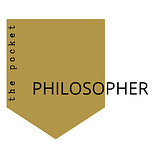Good morning Friends and welcome to our Weekly Rundown on Empathy.
Thanks to everyone who replied to our open thread, I was overwhelmed reading your feedback and am excited to jump in myself later today. If you hadn’t a chance, please hope over and comment about your experience with empathy!

Monday
Without empathy, we would be like ants or fish or lizards, aware of each other as bodies in space, but with no sense at all of the inner lives of each other.
—Dr. Rick Hanson
According to Psychologists Daniel Goleman and Paul Ekman who have studied this topic at length, there exists within us three primary types of empathy: Cognitive, Emotional, and Compassionate.
Cognitive empathy is the ability to imagine—not yet to feel or understand—the experience of another.
Emotional empathy is almost created sympathy. Once we can imagine what an experience for another is like, it’s pulling on our past, similar experiences to hypothesize what they might be feeling right now.
Finally, Compassionate empathy is a drive or motivation that moves us from imagination to action. It’s when we are motivated to step in and celebrate a victory, comfort a loss, or help in a crisis.
Tuesday
Therefore:
See others as yourself.
See families as your family.
See towns as your town.
See countries as your country.
See worlds as your world.
—Tao Te Ching, 54
The vast majority of the Tao Te Ching invites the reader into a place of humility and service before others. Often, the Tao is said to be found in the “low places” and the “valleys.” The Tao claims to be like water, flowing into the dark and unseen regions of the land.
Here in chapter 54, the author is talking about building a virtuous state. Confucianism has rituals, rites, and rules to achieve virtuosity. But the Tao encourages us to empathize. The skill of seeing all families as our own, all towns as our own, all people as ourself, is the key to understanding the world itself.
And this is a two way street. Understanding others can help us to understand ourselves. And likewise, understanding ourselves can help us to understanding others. The act of empathy enables a certain connection that leads to collective virtue and stability.
Wednesday
Deep listening is the kind of listening that can help relieve the suffering of another person. You can call it compassionate listening. You listen with only one purpose: to help him or her to empty their heart…You just listen with compassion and help them to suffer less. One hour like that can bring transformation and healing.
—Thich Nhat Hanh
When someone is capable of surrendering, truly ceasing their own internal monologue, and can give you space to communicate your thoughts and feelings without judgement, transformation happens.
Thich Nhat Hanh speaks of a retreat his community held for two factions of warring parties in another country. By the end of two weeks, these people who had been engaged in physical violence toward one another were capable of speaking to the other in profoundly healing ways. Because they had settled much of their inner turmoil, and were capable of listening to and understanding their enemy.
And that, Thich Nhat Hanh suggests, is the power of deep listening. He believes that conflict from interpersonal issues to national wars are rooted in fear, ignorance, and misunderstanding. Each of which are traits that can be addressed in deep listening practices.
Thursday
“Rarely can a response make something better. What makes something better is connection.”
– Dr. Brené Brown
According to Dr. Brown, the best way to understand empathy is to compare to its opposite, which is sympathy. She believes that empathy drives connection, while sympathy drives disconnection.
The reason: empathy requires vulnerability and authenticity, while sympathy (coming from a good place) keeps a distance between the one suffering and the one offering solidarity.
But that is at the heart of her research, and it mirrors what we saw yesterday in Thich Nhat Hanh’s Deep Listening advice—empathy is free of judgement and is fueled not by solution giving, but simply by connection.
And so Dr. Brown breaks down empathy into 4 steps. She says empathy requires:
Perspective Taking, or putting yourself in someone else’s shoes.
Staying out of judgement and listening.
Recognizing emotion in another person that you have maybe felt before.
Communicating that you can recognize that emotion.
Conclusion
And so after week with this theme, I have noticed a few common threads emerge:
It’s ok if you are in need of empathy and are not in space to give it, that self-awareness is key.
If you are in space to show empathy, it begins with the skill of deep listening.
Deep listening is not about offering solutions, but simply being with someone in their suffering (or joy) in a nonjudgemental state.
The final step of empathy is usually some form of communication that alerts the other person that we genuinely hear them and are here for them in solidarity.
Of course, this is one person’s distilled idea from one vantage point. So please comment here, head over to the thread, and let us know what you took from this week’s wisdom!
As always friends, I’m grateful for the time we’ve had together this week and am looking forward to next week!
Have a great, restful weekend,
Matt











